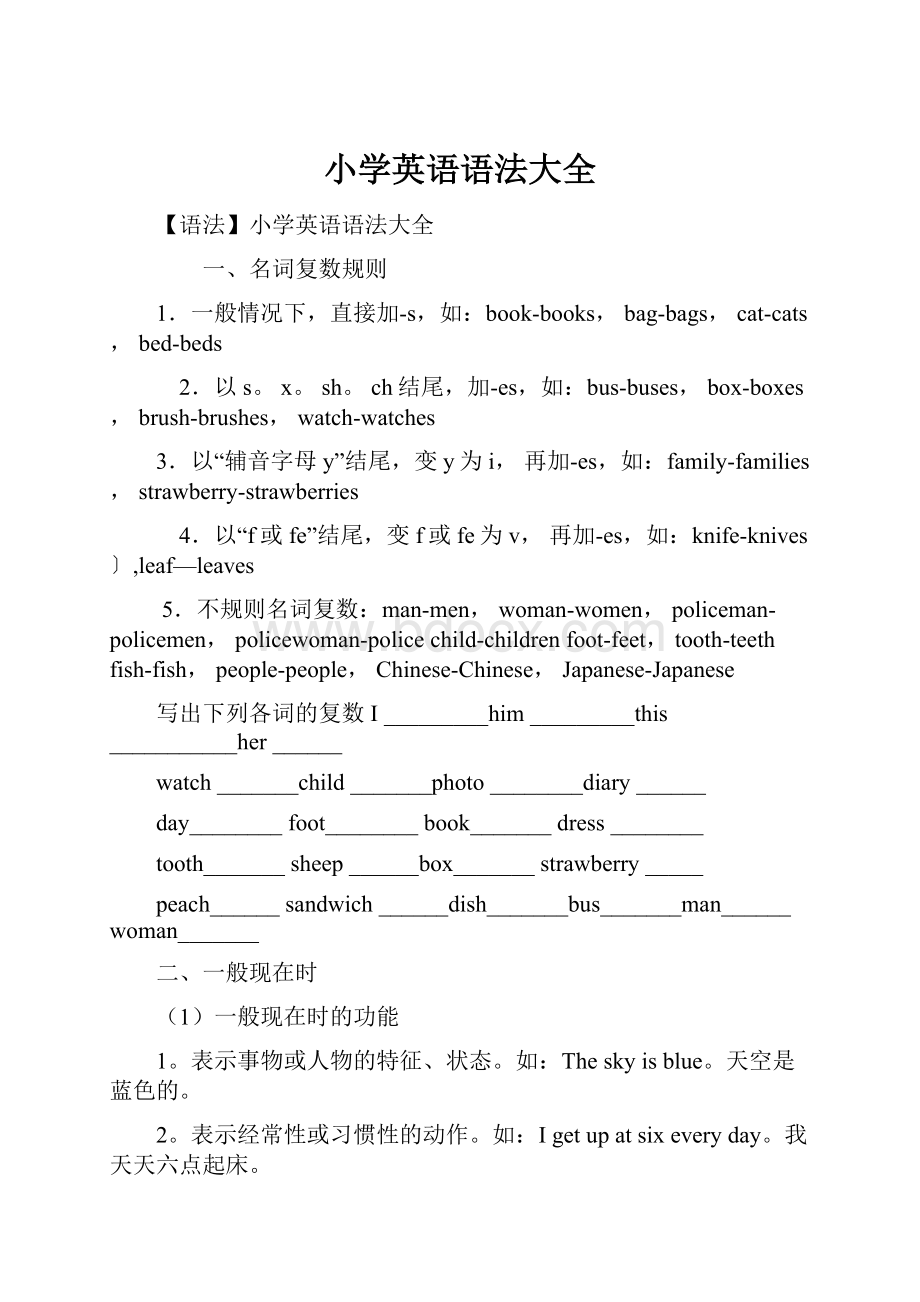 小学英语语法大全.docx
小学英语语法大全.docx
- 文档编号:26202870
- 上传时间:2023-06-17
- 格式:DOCX
- 页数:14
- 大小:19.93KB
小学英语语法大全.docx
《小学英语语法大全.docx》由会员分享,可在线阅读,更多相关《小学英语语法大全.docx(14页珍藏版)》请在冰豆网上搜索。

小学英语语法大全
【语法】小学英语语法大全
一、名词复数规则
1.一般情况下,直接加-s,如:
book-books,bag-bags,cat-cats,bed-beds
2.以s。
x。
sh。
ch结尾,加-es,如:
bus-buses,box-boxes,brush-brushes,watch-watches
3.以“辅音字母y”结尾,变y为i,再加-es,如:
family-families,strawberry-strawberries
4.以“f或fe”结尾,变f或fe为v,再加-es,如:
knife-knives〕,leaf—leaves
5.不规则名词复数:
man-men,woman-women,policeman-policemen,policewoman-policechild-childrenfoot-feet,tooth-teeth fish-fish,people-people,Chinese-Chinese,Japanese-Japanese
写出下列各词的复数I_________him_________this___________her______
watch_______child_______photo________diary______
day________foot________book_______dress________
tooth_______sheep______box_______strawberry_____
peach______sandwich______dish_______bus_______man______woman_______
二、一般现在时
(1)一般现在时的功能
1。
表示事物或人物的特征、状态。
如:
Theskyisblue。
天空是蓝色的。
2。
表示经常性或习惯性的动作。
如:
Igetupatsixeveryday。
我天天六点起床。
3。
表示客观现实。
如:
Theearthgoesaroundthesun。
地球绕着太阳转。
(2)一般现在时的构成
1。
be动词:
主语be(am,is,are)其它。
如:
Iamaboy。
我是一个男孩。
2。
行为动词:
主语行为动词(其它)。
如:
WestudyEnglish。
我们学习英语。
当主语为第三人称单数(he,she,it)时,要在动词后加“-s”或“-es”。
如:
Marylikes
Chinese.玛丽喜欢汉语。
(3)一般现在时的变化 1。
be动词的变化。
否定句:
主语+benot+其它。
如:
Heisnotaworker。
他不是工人。
一般疑问句:
Be+主语+其它。
如:
-Areyouastudent?
-Yes。
Iam。
/No,I‘mnot。
非凡疑问句:
疑问词一般疑问句。
如:
Whereismybike?
2。
行为动词的变化。
否定句:
主语don’t(doesn’t)动词原形(其它)。
如:
Idon’tlikebread。
当主语为第三人称单数时,要用doesn’t构成否定句。
如:
Hedoesn’toftenplay。
一般疑问句:
Do(Does)主语动词原形其它。
如:
-Doyouoftenplayfootball?
-Yes,Ido。
/No,Idon’t。
当主语为第三人称单数时,要用does构成一般疑问句。
如:
-Doesshegotoworkbybike?
-Yes,shedoes。
/No,shedoesn’t。
动词的变化规则1.一般情况下,直接加-s,如:
cook-cooks,milk-milks
2.以s。
x。
sh。
ch。
o结尾,加-es,如:
guess-guesses,wash-washes,watch-watches,go-goes
3.以“辅音字母y”结尾,变y为i,再加-es,如:
study-studies
一般现在时用法专练:
一、写出下列动词的第三人称单数
drink________go_______stay________make________look_________have_______pass_______carry____come________watch______plant_______fly________study_______brush________do_________teach_______ wash_______
二、用括号内动词的适当形式填空。
1。
Heoften________(have)dinnerathome。
2。
DanielandTommy_______(be)inClassOne。
3。
We_______(notwatch)TVonMonday。
4。
Nick_______(notgo)tothezooonSunday。
5。
______they________(like)theWorldCup?
6。
What_______theyoften_______(do)onSaturdays?
7。
_______yourparents_______(read)newspaperseveryday?
8。
Thegirl_______(teach)usEnglishonSundays。
9。
SheandI________(take)awalktogethereveryevening。
10。
There________(be)somewaterinthebottle。
11。
Mike_______(like)cooking。
12。
They_______(have)thesamehobby。
13。
Myaunt_______(look)afterherbabycarefully。
14。
Youalways_______(do)yourhomeworkwell。
15。
I_______(be)ill。
I’mstayinginbed。
16。
She_______(go)toschoolfromMondaytoFriday。
17。
LiuTao_______(do)notlikePE。
18。
Thechildoften_______(watch)TVintheevening。
19。
SuHaiandSuYang_______(have)eightlessonsthisterm。
20。
-Whatday_______(be)ittoday?
-It’sSaturday
三、现在进行时
1.现在进行时表示现在正在进行或发生的动作,也可表示当前一段时间内的活动或现阶段正在进行的动作。
2.现在进行时的肯定句基本结构为be动词ing。
3.现在进行时的否定句在be后加not。
4.现在进行时的一般疑问句把be动词调到句首。
5.现在进行时的非凡疑问的基本结构为:
疑问词+be主语+动词in
但疑问词当主语时其结构为:
疑问词+be+动词ing?
动词加ing的变化规则:
1.一般情况下,直接加ing,如:
cook-cooking
2.以不发音的e结尾,去e加ing,如:
make-making,taste-tasting
3.假如末尾是一个元音字母和一个辅音字母,双写末尾的辅音字母,再加ing,如:
run-running,stop-stopping
一、写出下列动词的现在分词:
play________run__________swim_________make__________
go_________like________write_________ski___________
read________have_________sing________dance_________
put_________see________buy_________love____________
live_______take_________come________get_________
stop_________sit________begin________shop___________
二、用所给的动词的正确形式填空:
1。
Theboy__________________(draw)apicturenow。
2。
Listen。
Somegirls_______________(sing)intheclassroom。
3。
Mymother_________________(cook)somenicefoodnow。
4。
What_____you______(do)now?
5。
Look。
They_______________(have)anEnglishlesson。
6。
They____________(not,water)theflowersnow。
7。
Look!
thegirls________________(dance)intheclassroom。
8。
Whatisourgranddaughterdoing?
She_________(listen)tomusic。
9。
It‘s5o’clocknow。
We_____________(have)suppernow
10。
______Helen____________(wash)clothes?
Yes,sheis。
四、将来时理论及练习
一、概念:
表示将要发生的动作或存在的状态及打算、计划或预备做某事。
句中一般有以下时间状语:
tomorrow,nextday(week,month,year…),soon,thedayaftertomorrow(后天)等。
二、基本结构:
①begoingto+do;②willdo。
三、否定句:
在be动词(am,is,are)l后加not或情态动词will后加not成won't。
例如:
I’mgoingtohaveapicnicthisafternoon。
→I‘mnotgoingtohaveapicnicthisafternoon。
四、同义句:
begoingto=will
Iamgoingtogoswimmingtomorrow(明天)。
=Iwillgoswimmingtomorrow。
1。
我打算明天和朋友去野炊。
I_____________________haveapicnicwithmyfriends。
I________haveapicnicwithmyfriends。
2。
我们将要学习英语 We_____________________learnEnglish. We________learnEnglish。
人称代词和物主代词
一。
用所给词的适当形式填空
1。
Thatisnot_________kite。
Thatkiteisverysmall,but_________isverybig。
(I)
2。
Thedressis_________。
Giveitto_________。
(she)
3。
Isthis_________watch?
(you)No,it’snot_________。
(I)
4。
_________ismybrother。
_________nameisJack。
Look!
Thosestampsare_________。
(he)
二、用am,is,are填空
1。
I______aboy。
______youaboy?
No,I_____not。
2。
Thegirl______Jack‘ssister。
3。
Thedog_______tallandfat。
4。
Themanwithbigeyes_______ateacher。
5。
______yourbrotherintheclassroom?
6。
Where_____yourmother?
She______athome。
7。
How_______yourfather?
8。
MikeandLiuTao______atschool。
9。
Whosedress______this?
10。
Whosesocks______they?
Be动词的用法:
(1)Am--wasIs--wasAre--were口诀:
我用am,你用are,is用在他她它,复数全用are。
(2)肯定和否定句Iam(not)fromLondon。
Heis(not)ateacher。
Sheis(not)inthediningroom。
Myhairis(not)long。
Hereyesare(not)small。
(3)一般疑问句AmIaChinese?
Yes,youare。
No,youaren’t。
AretheyAmerican?
Yes,theyare。
No,theyaren‘t。
Isthecatfat?
Yes,itis。
No,itisn’t。
用恰当的be动词填空。
1。
I______aboy。
______youaboy?
No,I_____not。
2。
Thegirl______Jack‘ssister。
3。
Thedog_______tallandfat。
4。
Themanwithbigeyes_______ateacher。
5。
______yourbrotherintheclassroom?
6。
Where_____yourmother?
She______athome。
7。
How_______yourfather?
8。
MikeandLiuTao______atschool。
9。
Whosedress______this?
10。
Whosesocks______they?
11。
That______myredskirt。
12。
Who______I?
13。
Thejeans______onthedesk。
14。
Here______ascarfforyou。
15。
Here______somesweatersforyou。
16。
Theblackgloves______forSuYang。
17。
Thispairofgloves______forYangLing。
18。
Thetwocupsofmilk_____forme。
19。
Sometea______intheglass。
20。
Gaoshan’sshirt_______overthere。
21。
Mysister‘sname______Nancy。
22。
This______notWangFang’spencil。
23。
______DavidandHelenfromEngland?
24。
There______agirlintheroom。
25。
There______someapplesonthetree。
26。
_______thereanykitesintheclassroom?
27。
_______thereanyapplejuiceinthebottle?
28。
There_______somebreadontheplate。
29。
There_______aboy,twogirls,threemenandtenwomeninthepark。
30。
You,heandI______fromChina。
人称代词和物主代词
1.人称代词主格和宾格的区别:
主格通常位于句中第一个动词之前(有时候位于than之后),宾格一般位于动词或介词之后。
2.物主代词形容词性与名词性的区别:
形容词性用时后面一般要带上名词,名词性则单独使用,后面不带名词。
二。
用所给词的适当形式填空。
1。
Thatisnot_________kite。
Thatkiteisverysmall,but_________isverybig。
(I)
2。
Thedressis_________。
Giveitto_________。
(she)
3。
Isthis_________watch?
(you)No,it‘snot_________。
(I)
4。
_________ismybrother。
________nameisJack。
Look!
Thosestampsare_________。
(he)
5。
_________dressesarered。
(we)Whatcolourare_________?
(you)
6。
Herearemanydolls,whichoneis_________?
(she)
7。
Icanfindmytoy,butwhere’s_________?
(you)
8。
Show_________yourkite,OK?
(they)
9。
Ihaveabeautifulcat。
_________nameisMimi。
Thesecakesare_________。
(it)
10。
Arethese________tickets?
No,________arenot_________。
________aren‘there。
(they)11。
Shall_________havealookatthatclassroom?
Thatis_________classroom。
(we)
12。
_________ismyaunt。
Doyouknow_________job?
_________anurse。
(she)
13。
Thatisnot_________camera。
_________isathome。
(he)
14。
Whereare_________?
Ican’tfind_________。
Let‘scall_________parents。
(they)
15。
Don’ttouch_________。
_________notacat,_________atiger!
16。
_________sisterisill。
Pleasegoandget_________。
(she)
17。
_________don‘tknowhername。
Wouldyoupleasetell_________。
(we)
18。
Somanydogs。
Let’scount_________。
(they)
19。
Ihavealovelybrother。
_________isonly3。
Ilike_________verymuch。
(he)
20。
MayIsitbeside_________?
(you)
21。
Lookatthatdesk。
Thosebookareon_________。
(it)
22。
Thegirlbehind_________isourfriend。
(she)
一、名词复数规则
1.一般情况下,直接加-s,如:
book-books,bag-bags,cat-cats,bed-beds
2.以s。
x。
sh。
ch结尾,加-es,如:
bus-buses,box-boxes,brush-brushes,watch-watches
3.以“辅音字母+y”结尾,变y为i,再加-es,如:
family-families,strawberry-strawberries
4.以“f或fe”结尾,变f或fe为v,再加-es,如:
knife-knives
5.不规则名词复数:
man-men,woman-women,policeman-policemen,policewoman-policewomen,mouse-micechild-childrenfoot-feet,。
tooth-teethfish-fish,people-people,Chinese-Chinese,Japanese-Japanese
练习:
写出下列各词的复数。
I_________ him_________ this_______ her______ watch_______book_______
child_______photo________diary______ day________ foot________dress________tooth_______sheep______ box_______ strawberry_____thief_______yo-yo______peach______sandwich______man______ woman_______paper_______people________
一、用括号内动词的适当形式填空。
1。
Heoften________(have)dinnerathome。
2。
DanielandTommy_______(be)inClassOne。
3。
We_______(notwatch)TVonMonday。
4。
Nick_______(not
- 配套讲稿:
如PPT文件的首页显示word图标,表示该PPT已包含配套word讲稿。双击word图标可打开word文档。
- 特殊限制:
部分文档作品中含有的国旗、国徽等图片,仅作为作品整体效果示例展示,禁止商用。设计者仅对作品中独创性部分享有著作权。
- 关 键 词:
- 小学英语 语法 大全
 冰豆网所有资源均是用户自行上传分享,仅供网友学习交流,未经上传用户书面授权,请勿作他用。
冰豆网所有资源均是用户自行上传分享,仅供网友学习交流,未经上传用户书面授权,请勿作他用。


 《爱和自由》读书心得15篇.docx
《爱和自由》读书心得15篇.docx
